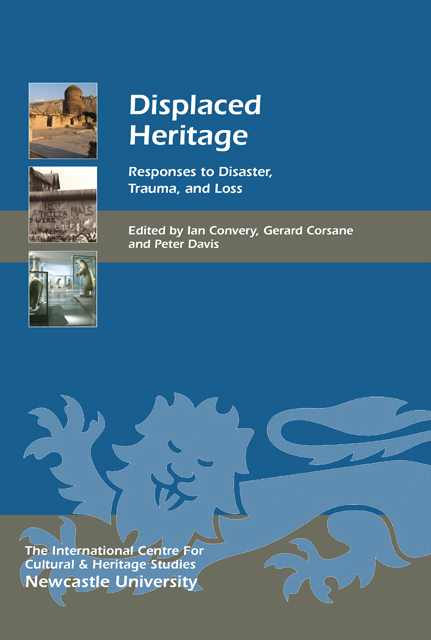Book contents
- Frontmatter
- Contents
- List of Illustrations
- Acknowledgments
- List of Abbreviations
- Preface
- Introduction
- Displaced Heritage: Histories and Tourism
- Displaced Heritage: Trauma, Confinement and Loss
- Displaced Heritage: Lived Realities, Local Experiences
- Displaced Natural Heritage
- Endpiece
- List of Contributors
- Index
- Heritage Matters
Endpiece
Published online by Cambridge University Press: 24 February 2023
- Frontmatter
- Contents
- List of Illustrations
- Acknowledgments
- List of Abbreviations
- Preface
- Introduction
- Displaced Heritage: Histories and Tourism
- Displaced Heritage: Trauma, Confinement and Loss
- Displaced Heritage: Lived Realities, Local Experiences
- Displaced Natural Heritage
- Endpiece
- List of Contributors
- Index
- Heritage Matters
Summary
In ending this book I have been asked to reflect back on a life working in disasters – in effect, a personal heritage of collected memories, materials and cultures. This has been a difficult task. On the one hand there is disease and death, the data of morbidity and mortality; on the other hand, there are the successes in rebuilding livelihoods and properties, a geography that is, frequently, one of affect. Affect is observed firstly in the disaster-impacted community itself, which is usually the first responder, and then seen in the external parties who help deliver relief, rehabilitation and reconstruction. Some explanation is required of the political economy of global disaster response as it is practised in the 21st century, not least because it has essentially become an industry. As this is polemical, it is perhaps best done in an older form of argument, namely theses statements.
Thesis 1
For the last two centuries, with the rise of capitalism, we have gone beyond the mastery of nature to the production of nature.
Under globalised capitalism, nature is produced (Smith and O’Keefe 1980). In the production of nature, people change their relationship to nature from that of husbandry, an organic relationship with the environment, to one of mastery, even if that mastery is never fully achieved. People also change their relationship to each other as individuals, communities and classes. Importantly, these changes also change the nature of risk and thus disaster type (Beck 1992; 2009).
It is relatively easy to illustrate these arguments. Fracking increases earthquake risk; flooding is increased by land-use change; climate change heralds increasing extremes of temperature and precipitation beyond what people accept as ‘normal’ weather. It is not simply the physical world but the biological one where fundamental changes are occurring, for example HIV/Aids, SARS epidemics and BSE outbreaks. Technology itself generates new risks, not least with nuclear engineering and biotechnologies. Science can only bring a limited solution to these problems, not least because the modern positivist science project comes encumbered with a dual vision of nature. This dual vision holds that nature is both ‘external’ to humans while simultaneously nature is ‘universalist’, incorporating humans. But a global capitalism necessarily produces a humanly nature in the realm of exchange, or market, values. Talk of a post-normal science to address complex problems simply reinforces the contradictory duality of the scientific approach to nature (O’Brien and O’Keefe 2014).
- Type
- Chapter
- Information
- Displaced HeritageResponses to Disaster, Trauma, and Loss, pp. 321 - 324Publisher: Boydell & BrewerPrint publication year: 2014



